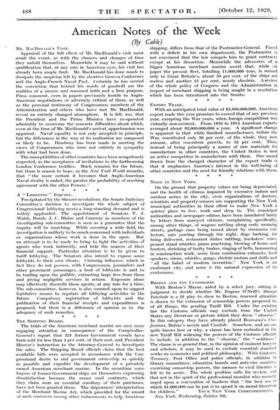BOSTON AND THE CENSORSHIP.
With Boston's Mayor, aided by a select jury, sitting in judgment- to decide whether Mr. Eugene O'Neill's Strange Interlude is a fit play to show to Boston, renewed attention is drawn to the extension of censorship powers proposed in, of all things, the pending Tariff Bill. Under the existing law the Customs officials may exclude from the United States any literature or picture which they deem " obscene." In this category they have already placed Rousseau's Con- fessions, Balzac's novels and Candide. Somehow, and no one quite knows how or why, a clause has been embodied in the new Tariff Bill widening the powers of the Customs officials to include, in addition to the " obscene," the " seditious." The clause is so general that, in the opinion of eminent lawyers and scholars, it may be used to exclude essential standard works on economics and political philosophy. With Customs, Treasury, Post Office and police officials, in addition to library committees, education boards and anti-vice societies, exercising censorship powers, the menace to civil liberties is felt to be acute. The whole position calls for review, and that not in the spirit of the professional moralist who recently urged upon a convention of bankers that " the best use to which $1,000,000 can be put is to spend it on moral literature








































 Previous page
Previous page